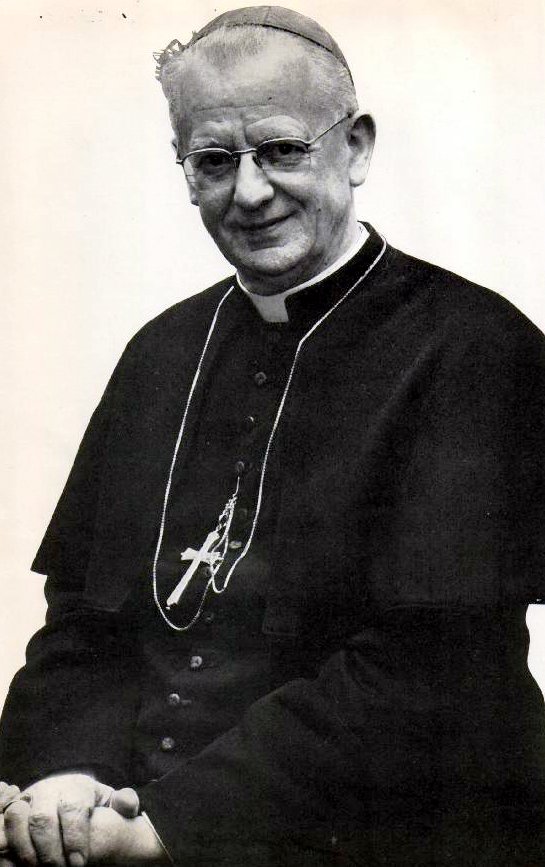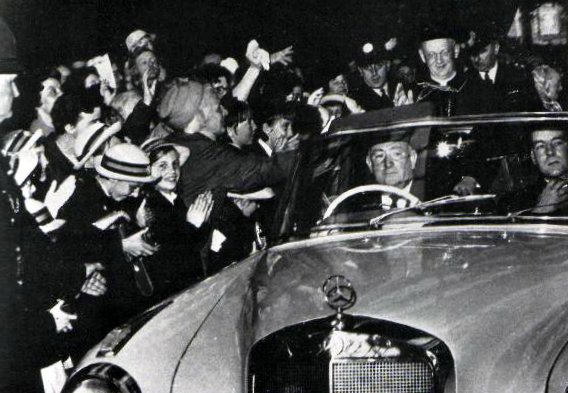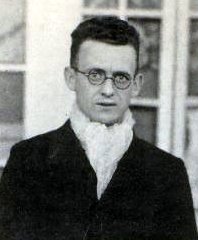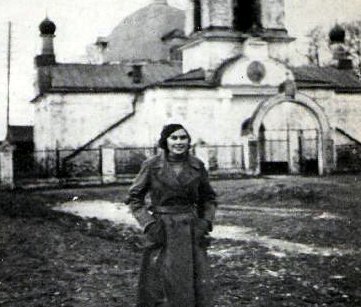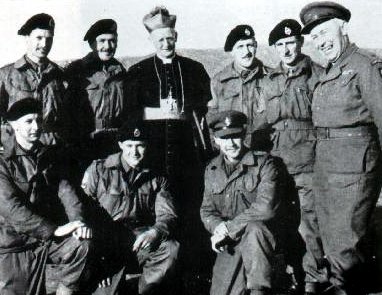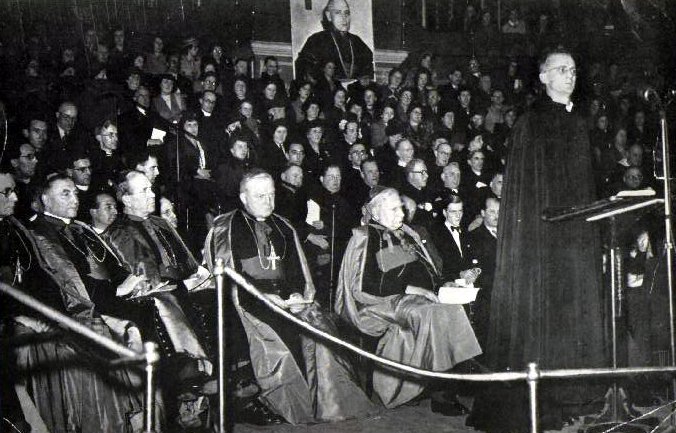Cardinal John Heenan: “Mission To Moscow”
The English Catholic church in the 20th century has strangely enough been directed by three men whose surnames all began with the letter H: Hindsley, Heenan and Hume. And all were all appointed by Rome at a time of great disruption in the Catholic church in England.
With the death of Basil Hume, it may one day happen that his church will name him a “saint.” But as far as I know, no such clamour ever started for the previous two cardinals of Westminster to be granted such a title, if indeed they ever wanted such an accolade.
Cardinal Hindsley was before my time as an observer of the Vatican. But I do however remember seeing pictures of him in the daily papers my parents took in those pre-Vatican II days.
But John Carmel Heenan I remember very well indeed. I met him just once in 1964 at the French Church in Farringdon, London. It was an occasion of an anniversary, perhaps of the D-Day landings or the Allies triumphant entry into Paris. I do remember that he officiated over the solemn high mass on a Sunday morning, and because it was a warm morning, he quietly fell asleep on his raised ornate chair.
Afterwards, at a catered buffet (perhaps by Charles Forte) I stood next to a tall well-dressed gentleman with a large nose and delightful smile and chatted about nothing really. He was, I later learnt, the French ambassador at the court of St James. His name was Geoffrey DeCourcey.
He interestingly enough had been an aide-de-camp to General De Gaulle during the Second World War, when the general was ensconced in a London hotel, then used for the Free French Government then in exile (it might have been the Savoy or the Dorchester).
But in hindsight, I wish I had asked him about that exciting period during the Second World War when London celebrated its finest hour, but alas I didn’t.
The cardinal, however, I do recall. He was a tall heavyset man who when talking to you would look down at you through his thick-lensed glasses. He also had the habit of holding his hands together over his stomach as he listened to you. Not sure he would have listened to me today if I tried to offer him a Bible tract and ask if he knew for sure heaven awaited him? One person who remembers him at that time found him rather overbearing in conversation (this must have led to the unkind nickname of him being christened “handbag” Heenan). How cruel the tongue can be! But if he knew of such a sobriquet, I never found out.
(Man in a Merc. They always have travelled in style)
Joining a small group standing around him I heard a well-spoken lady ask him: “Aren’t you excited, eminence, about what’s happening in Rome?” She meant, of course, the Second Vatican Council. He snorted with disdain, clearly, he wasn’t happy at all about what was happening in his beloved church, both in Rome and in England, and with what was fast rolling out from the theological bandwagon at the Vatican.
There were also many of those merry men guiding the Vatican council along the road to perdition or reform (it must have seemed unstoppable at the time). I do have to wonder, did Heenan see them coming, somehow I doubt it).
But then it must have seemed a far cry for the boy who was born in Ilford, Essex in 1905, to a middle-class Catholic family. Of that far away period, he would confess: “Mine was a happy childhood.” All of this would, however, change in old age for him, after the terrible onslaught of Vatican II.
Heenan would later study for the priesthood at the distinguished English College in Rome. (The rector at the college then was mgr. Hindsley who would later become the archbishop of Westminster, and John Heenan would later go on for a time to be one of his private secretaries).
After ordination in 1930, he writes in vol. 1 of his autobiography: “That I conceived a strong desire to visit the U.S.S.R.” One wonders why and for what purpose?
Sometime before his ordination he begins taking an avid interest in what was known then as experimental psychology.
Perhaps at this point, we should offer a brief précis of his memoirs. It goes something like this:
A young man is selected by his bishop to finish his studies at the exclusive all-male English College in Rome, where he befriends another young seminarian. However, the rector of the seminary befriends the two young men and later will play a pivotal role in each of their future lives. Soon after leaving Rome he starts to study experimental psychology and decides to visit the U.S.S.R, then one of the most repressive atheist police states in the world, to see for himself how Marxism can be contained or perhaps copied.
After making up his mind to do this covertly and without the blessing or permission of his diocesan bishop (but it seems with the full support and approval of the new cardinal, his old seminary rector) both he and his friend would become the cardinal’s secretaries. Now he can plan his proposed visit to Russia.
But to do this he needs a new identity to obtain a visa and new passport, which he does; seems all rather easy! He is addressed as a doctor of psychology and not theology.
Somewhere along the waterfront, the reverend has been quietly discarded. Now his new official black and white passport photo betray not a dog collar but a soft woollen scarf. He even arranges close friends to furnish him with a new address and go along with the lie. After much more subterfuge he finally sets sail from Tilbury Docks in London on a sea-scarred tramp steamer bound for Stalin’s Russia.
Also joining him on board is an assorted cast of players straight out of central casting it seems. Each evening they assemble at the captain’s table to sample Russian cuisine, vodka and caviar! And I suspect to discuss politics, the world and maybe even religion.
(His double image)
Each day the paying passengers get to know each other a little more both on and below deck. None, of course, realize or are informed by the young man that he is an ordained catholic priest. Later in Moscow, he is introduced to a young translator named Lola, she also is unaware of his true profession (priest that is not a psychologist).
Whilst in KGB-controlled Moscow and in the countryside, it seems he is able to go where he wishes and even take photos with his camera, concealed in his leather tobacco pouch, very ingenious, you have to admit. He even takes secret snaps of political prisoners working in the fields.
He finds time to seek out a convenient Catholic church and receive communion (all of this at the time in Russia, known as The Great Terror, with the secret police loading millions of innocent people who didn’t fit into their socialist/atheist agenda into stinking cattle trucks destined for Siberian gulags!) What is going on here, you ask?
In the meantime, his growing relationship with the young Russian translator ripens. How far it progresses we do not know until soon before his departure he writes her a long revealing letter informing her that he is going to give his future life to the priesthood (he is in fact already destined for a parish in Essex, but informs her that he will be sent to Africa, as a missionary!)
(Lola in happier times)
Lola is concerned and does not think that his future vocation is such a good idea for him or for her. Instead, she happily remembers the jolly parties in downtown Moscow that he and her friends enjoyed. But everything has to end, doesn’t it? Soon he must sadly wish her, forever, dostvidanya.
After leaving Moscow via Poland and a detour in Nazi Berlin, he arrives home to England, and life as a priest carries on for him as before. Later he writes that he doubts Lola survived Stalin’s frequent fanatical purges, rather like Lara in Pasternak’s bittersweet bestseller Dr. Zhivago, or maybe she perished in the war, another causality of this fallen world that will exist in until Christ returns in glory (Rev. 19:11-16)!
To really try and understand the full flavour of this strange period of John Heenan’s secret life in Russia, you have to read his autobiography and search for clues yourself. Sorry, but we can’t do it all for you.
But to me reading his portrait of life in the so-called “workers paradise,” it does read rather like a Graham Greene scenario for one of his tortured Catholic novels. What it does suggest to me is that he was able to enter into the acting world of cloak and dagger and all of which with some skill. And didn’t I read somewhere how John Paul II had always wanted to be an actor and he certainly played to capacity audiences didn’t he!
What I do find concerning is the network of lies that he was able to construct around the fictitious character he played and with relish it seems, and how he had no qualms in his psyche about the deceit and the untruths he spread all around him. I hope he went to confession when he got back to his parish (not that it will help him).
How he was able to acquire a fake passport is a mystery to me but as he wrote: “It was not difficult to obtain a fresh passport which gave my profession as a lecturer in Philosophy.” To give false personal details is of course illegal.
But then he does proudly name his autobiography Not The Whole Truth. Interesting title isn’t it and from a prince of the church at that!
The 1960s brought not only the Vatican Council but also a drastic decline in open public morals. Down crashed the walls of sexual inhibition and in came promiscuity, pop music and the pill! It was rather like the fall of the Berlin Wall. No opposition could halt its popular collapse, and nothing in Germany was ever going to be the same again, was it. And you know what: it was just the same in the Catholic church, post-Vatican II.
Out went the Latin Tridentine mass as well as carved oak pulpits, fitted cassocks and birettas (hats not guns that is), and expensive donated brass altar rails all got the clerical chop.
I once heard of a disgruntled catholic priest in south London who despised Vatican II and its mandatory reforms so much that he took an axe into his church and demolished both pulpit and rails, and with deep relish. He even ordered embroidered gold threaded antique mass vestments to be incinerated by his housekeeper’s husband in the rectory garden, now this sounds more like Evelyn Waugh to me).
But for Heenan, it also meant that he had become a TV celebrity both on the David Frost Show and a commissioned serious of BBC television programmes, concerning the Catholic church, with Malcolm Muggeridge being the presenter.
Muggeridge had in the past sharpened his interviewing skills as an atheist inquisitor. He must have interviewed most of the celebrities of the 1950-1960s, but would late in life quietly convert to the Catholic church, along with his wife. I suspect Heenan had a hand in that decision as well.
On a personal note, I once met Malcolm at a vegetarian soiree in the town that I was living in then. As we chatted I found out that as a boy he had lived in the road next to mine and knew the house I was living in; small world isn’t it. He was a very unassuming man and I remember liking him. I also remember he kindly signed a small book for me as a souvenir. Sadly, I no longer have it, due to a fire.
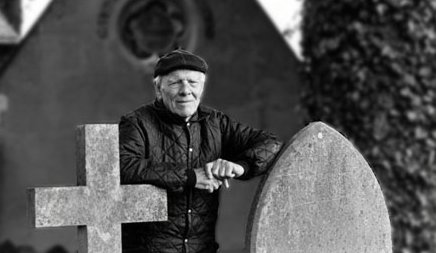
(Muggeridge, shortly before his death)
Heenan lived in the age where the art of sound bites hadn’t yet been perfected. But here are some of his that deserve to be heard again.
“It is a form of pastoral sadism to disturb simple faith,” on progressive theologians tampering with his faith and others.
On the then new interfaith communion edict, he replied that he could only conceive of it “in the most exceptional circumstances, maybe in a concentration camp.”
And once talking to cardinal Winning of Glasgow concerning a new document written collectively by the English bishops he said: “Well get it translated and made simpler for you to read.” How patronizing.
I remember a story told to me by an Irish priest who arrived to study at an English seminary. It seems that on his first day the rector turned to him and said with a smirk: “I won’t hold it against you that you’re Irish.” I wonder if this snobbery still continues today in the Catholic church? And after hearing this sad story told to me, I couldn’t help wishing that my friend had turned around and walked out of that stifling hothouse atmosphere, but sadly he did not.
I also suspect that at the end of Heenan’s life he too wished he could have just walked away from all the changes of Vatican II. All of this must have caused his health to suffer precariously as well.
(With British troops in Japan)
What did hit the Catholic church in England and abroad like a twister was the publication of the pope’s encyclical Humane Vitae, published on June 29th 1968. I also suggest that today the Catholic church has still yet to recover from it.
Or as author Garry Wills wrote: “With Humane Vitae…Pope Paul did to his reign what Lyndon Johnson did with the Vietnam War. From that moment on everything seemed to run downhill.”
Heenan was naturally caught up in the massive fallout by the fact that he was an appointed member of the pontifical commission that would prepare a draft report for the pope to look at. All of this hung on the teaching that the “church held that contraception was intrinsically evil because it was contras to natural law (i.e., the rhythm method that the church preferred and promoted, or as it became laughingly called, “Vatican roulette.”)
Maybe it was thought that through press briefings the commission, naturally made up of mainly celibate men in their mid-60s of course, might relax the teachings of their church, and that a decision as regards contraception should be left to individual married couples as a matter of their consciences.
Heenan, it seemed, rather liked this modern suggestion. It might just be a compromise that might work.
The only problem was that the bachelor bishops in Rome did not buy it. Instead, it seems they got to the pope and whispered in his ear. And all expectation of any future change was declared null and void. Birth control was out, except for the church’s teachings. Or as one obstetrician noted sarcastically who had been a member of the papal commission: “I cannot believe that salvation is based on contraception by temperature, and damnation is based on rubber.” Ouch, that hurts, doesn’t it!
(Bishops solidarity conference for cardinal Mindszenty)
Not so, shouted Rome in holy anger to all their numerous critics in and out of their church. There must be obedience to the pope, or else thundered the Vatican daily newspaper L obsservator Romano.
Heenan naturally found himself having to defend a document that I don’t think he believed in any way.
Later when asked about this on Frost’s television show and on what he would say to a prospective Catholic couple who wished to practice birth control, he replied: “God bless you. If their following their conscience, then in the sight of God, which is all that matters – the priest, the bishop, the pope doesn’t matter compared with God, if every person is really dealing with Almighty God” (London Weekend Television, December 1968).
This of course came to the attention of the apostolic delegate in London, the popular archbishop Inigo Cardinale. Naturally, he wasn’t happy with this slick interpretation of the catholic church’s teaching on birth control.
(I once heard a story told about the Foreign Secretary in the Wilson Government who arrived at an embassy reception in the condition the Irish call “nine sheets to the wind.” Casting his bleary eye around the crowded room he spied, according to a friend, “this beautiful creature in scarlet” only to find out as he bent down to kiss the manicured hand that it was indeed the pope’s man in London. Yes, it seems he was wearing his silken robes. One has to speculate who was embarrassed the most at this sudden burst of affection).
Cardinale once explained in an interview that: “God bless you” really meant, well according to him, “God help you.” So there speaks Rome on the use of the Almighty’s name!
Later the ill-fated encyclical would be nicknamed with glee by the press as “Heenan’s baby.”
Yet another nickname he had to live with it seems. He certainly collected them, didn’t he!
(Incidentally, Malcolm Muggeridge was nicknamed after his conversation as “St Mug”).
Vatican II and its ongoing reforms also bothered Heenan as well, especially the liturgy reforms. Much of his caustic views can be found in the second book of his autobiography. And his differences with the theologian Charles Davis and Peter De Rosa were part of a much wider raft of what he saw as the disrespect shown to him and their church’s teachings. Heenan in his book claims conspiratorially that pope John XXIII had only expected the council to run a mere 3-6 months, not years.
In fact according to Jean Guitton, the last words of John XXIII spoken on his deathbed in 1963 were: “Stop the council. Stop the council.”
John XXIII, he claimed, did not suspect what was being planned by the liturgical experts who were then known as the German mafia i.e., Kung, Rahner, and Joseph Ratzinger.
I suspect that the reforms, which filtered down in the 1970s, must have caused a frequent assault upon his immune system causing a great deal of physical pain. I did read that he suffered the discomfort of shingles. (I have suffered some of this myself but only in small doses. I cannot imagine the distressing pain that he went through when it attacked, I believe his eyes and face; poor man).
In the conclusion of his final autobiography, he writes: “Many a thorn was added to my crown during the stormy sixties.”
I rather dislike this personal analogy that he equates with the suffering of my Saviour. Whatever pain John Heenan tasted it was nothing compared to the agony and humiliation heaped upon the Lord by crude Roman soldiers at the behest of proud Pontius Pilate.
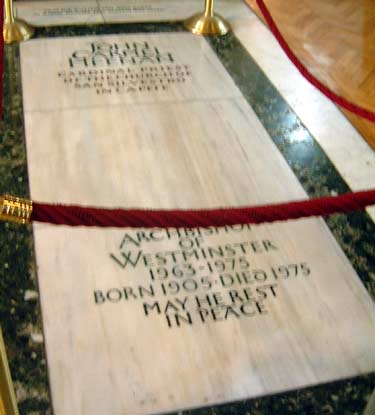
(Buried in Westminster Cathedral)
And listen, dear reader: it was done for your wretched sins and mine: “So Christ was once offered to bear the sins of many; and unto them that look for him shall he appear the second time without sin unto salvation” (Heb. 9:28).
This verse we should read each day in relation to ourselves!
But welcome it or not the permanent revolution of Vatican II had arrived in his church and with a vengeance. Jackie Heenan was just one of the victims who tried to prevent it from spreading, and in doing so, failed miserably in the process.
Maybe he should have grabbed his beret, taken a suitcase of Bibles (King James of course) and quietly booked a berth on the next passing ship to Russia. He might just have returned home a changed and saved man. And you know what: you don’t need to be a genuine psychologist or not to work that one out, do you?
Update: September 2017
Did John Heenan when the bishop of Leeds subvert the course of justice of a murdered polish priest?
The disappearance or murder of the polish priest, Henry Borynski, is still unsolved and probably never will be.
In 1953 this popular young priest was sent by bishop Heenan as he was then to a parish church in Bradford. Then the church was under the parish priest, a canon Boleslaw Martynellis, another Pole in fact.
From the start, there seems to have been some growing resentment from Martynellis towards Borynski. Nobody seemed to know why.
One can perhaps envisage the preposterous pantomime of two polish priests circling each other in and out of the church presbytery, with one it seems to conceal murder in his heart for the other, but which one?
Borynski was later trained as one scenario suggests and sent by the subservient polish secret police as a paid agent to spy on the large polish population then living in Bradford; they, of course, being no friends of the communists.
Somehow Martynellis, who had served 18 months in a gulag in Siberia (and survived, can you believe) may have witnessed something suspicious in Borynski, and later murders him, but on whose orders is unclear.
Or apparently, an assassin from the old NKVD murder squad is dispatched to Bradford to dispose of Borynski, then using a crude cyanide spray he later disposes of the body on Ilkley Moor. That’s what an agent apparently confessed to years later in prison. Again we are not sure what the motive was.
At the time of the disappearance of the young priest there was also a cryptic message written in a European language and set in matchsticks in the presbytery, can you believe, warning Martynellis: “To keep quiet, priest.”
Also, it is suggested that Martynellis somehow used chemicals himself to dispose of the younger priest’s body. So, either he silenced the priest or he paid someone else to clean up the mess. Martynellis died two years later.
Whatever happened to him, we know he was a 14-stone priest who just “disappeared,” supposedly murdered and later buried on a bleak moor (where Brady and Hindley disposed of their sickening crimes against children years later).
The amazing thing is how Heenan was able to put the brakes on a criminal investigation. Later he is able to silence all police enquires with I suspect assistance from higher obliging friendly government officials.
This is interesting because cardinals Mahoney, Law, Murphy-O’Connor, Pell and Barbarin were unable themselves to bury the wicked global paedophile scandals when news broke about their ugly and wicked cover-ups in the church of Rome over the last twenty years or so!
Some of them were/are required to face different levels of official court procedures into their own colluding hierarchies. It appears prelates today are not so easily able to stifle or bury police enquires, unlike bishop John “Jackie” Heenan, who it seems had a lot of clerical clout years ago in burying any police enquiry into his church, and with the greatest of ease it seems.
Somewhere today a murdered young priest’s body or his remains is still waiting to be located (if ever). To date, nobody has ever been arrested or charged with the murder or disappearance of Henry Borynski.
Some years ago a retired police officer, a Detective Chief Supt. Bob Taylor, who worked on the case remarked on the BBC Inside Out programme: “Catholic officials knew more than they disclosed to the police in Bradford at the time.”
In other words, yet another wicked Vatican cover-up!
Sources
The Runaway Church, Peter Hebblethwaite, S.J
Both autobiographies of cardinal Heenan, Not The Whole Truth & A Crown Of Thorns
Assorted news articles
GPB
2006-2017
(All Rights Reserved)
